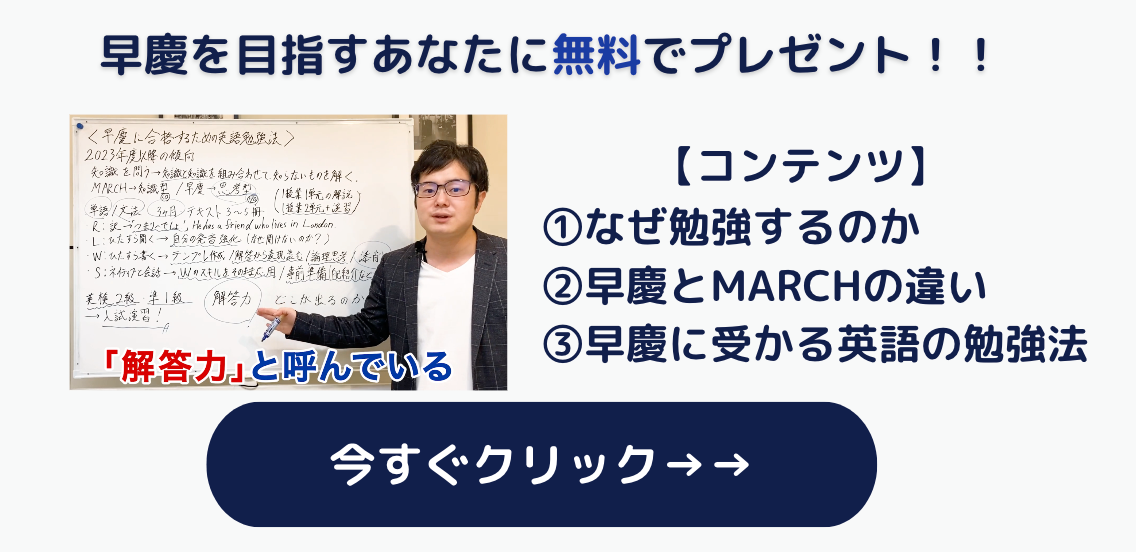Contents
(1)~(5)と同じ文型のものを、下の中から2つずつ選びなさい。
| (1) | She worked hard. | |
| (2) | We love our parents. | |
| (3) | Are you busy now? | |
| (4) | He gave me this novel. | |
| (5) | He named his son Thomas.(name「~に・・と名づける」) |
| ア | You look tired. |
| イ | She laughed at me. |
| ウ | Will you show me your house? |
| エ | I saw Mary yesterday. |
| オ | You must keep your room clean. |
| カ | I wrote a letter in English. |
| キ | I found the book interesting. |
| ク | He will be a good engineer. |
| ケ | He went there for himself. |
| コ | Who taught you music? |
ヒント
| (1) | |
| (3) | |
| (コ) |
次の文型を答え、全文を和訳しなさい。
| (1) | Jack found the book easy. |
| (2) | Jack found the easy book. |
| (3) | Jack found the book easily. |
| (4) | She bought Tom a dictionary. |
| (5) | Her mother made a new dress. |
| (6) | Her mother made her a new dress. |
| (7) | He made the girl his secretary.(make「~を・・にする」、secretary「秘書」) |
次の各文に下線を引いてSVOCに分けなさい。
| (1) | Everyone enjoys swimming in summer. |
| (2) | To teach is to learn. |
| (3) | He gave us a lot of apples. |
| (4) | Children fear to go in the dark.(fear「~を怖がる」) |
ヒント
| (1) | |
| (2) | |
| (3) |
次の各文に下線を引きSVOCに分けなさい。
| (1) | I know the news. |
| (2) | I know that he married her.(marry「結婚する」) |
| (3) | He told me the news. |
| (4) | He told me where to go. |
| (5) | He told me that she liked me. |
| (6) | That he married her is great. |
| (7) | The fact is that he did it.(fact「事実」) |
| (8) | I don't know whether he will come.(whether「~かどうか」接続詞) |
ヒント
| (2) | |
| (4) | |
| (8) |
下線部の品詞を、下の選択肢から選びなさい。
| (1) | Everybody likes peace and freedom. | |
| (2) | Strike while the iron is hot. | |
| (3) | Seeing is beliving. | |
| (4) | I have a lot of work to do this evening. | |
| (5) | Suddenly I took a letter written in English. | |
| (6) | Please wait till I water the flower in the garden. | |
| (7) | In my boyhood Father would often play with me. | |
| (8) | I filled my glass with wine from the glass bottle. | |
| (9) | Have a look at him. |
[名詞 / 形容詞 / 動詞 / 副詞 / 前置詞 / 接続詞]
ヒント
| (1) | |
| (2) | |
| (4) | |
| (6) | |
| (7) | |
| (8) | |
| (6) |
|
次の動詞の自動詞(Vi)他動詞(Vt)を分けなさい。
| (1) | happen「起こる」 | (6) | respect「尊敬する」 |
| (2) | visit「訪れる」 | (7) | breathe「呼吸する」 |
| (3) | accept「受け入れる」 | (8) | suggest「提案する」 Vt |
| (4) | disappear「消える」 | (9) | turn「変わる」 |
| (5) | praise「ほめる」 | (10) | turn「変える」 |
(1)~(3)は2文の意味が同じになるように、 ( )内に適する前置詞を入れ、(4)~(6)は第4文型から第3文型に 書き換えなさい。参照
| (1) | Tom wrote us a long letter. Tom wrote a long letter ( ) us. |
| (2) | Mother made me a pretty dress. Mother made a pretty dress ( ) me. |
| (3) | The teacher asked me many different questions. The teacher asked many questions ( ) me. |
| (4) | Did you buy your sister a present? |
| (5) | Will you show me your new house? |
ヒント
| (1) | |
| (2) | |
| (3) |
次の各文の文型を答えなさい。
| (1) | He gave John nothing. |
| (2) | Her voice was soft and pleasant. |
| (3) | No one sees his own faults. |
| (4) | The report finally proved true. |
| (5) | My aunt showed me her album. |
| (6) | English, in some form, has long served as the world language. |
| (7) | Father taught me how to fish. |
| (8) | This morning I took a slow walk to the park. |
| (9) | He has now learned that he cannot have his own way. |
| (10) | Don't neglect writing to your mother. |
ヒント
| (4) | |
| (6) | |
| (10) |
次の各文の文型を答えなさい。(入試レベル)※今は読み流してもかまいません
| (1) | The sight reminded me that I had been there. |
| (2) | Everyone thinks his own burden the heaviest. |
| (3) | The most conservative British politicians were critical of huge U.S. budget deficits. |
| (4) | The walls of difference, laziness, and coldness that isolate each of us from others would melt like snow in Spring. |
ヒント
| (1) | |
| (2) | |
| (3) | |
| (4) |
文中における下線部分の品詞を、 下の選択肢から選びなさい。
| (1) | I have done it of my free will. | |
| (2) | Neither of the students handed in their research paper. | |
| (3) | I heard the competition but he wouldn't tell me when and where. | |
| (4) | An action to better the quality of the teachers must be taken to improve the school. |
[名詞 / 形容詞 / 動詞 / 副詞 / 前置詞 / 接続詞]
ヒント
| (1) | |
| (2) | |
| (3) | |
| (4) |

